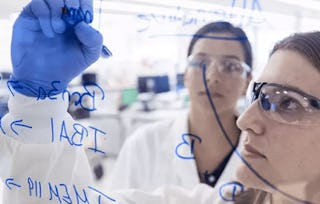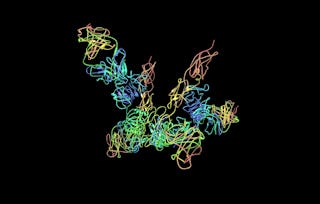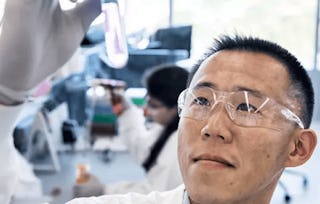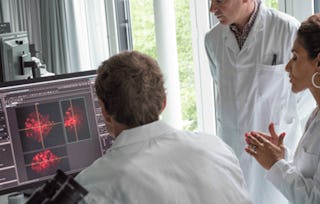What does it take to advance a new drug from the laboratory bench to the patient’s bedside? Historically, drugs were discovered serendipitously and were usually isolated from natural sources. Today, drug discovery efforts take many years and cost hundreds of millions of dollars. They also require the input of dozens of specialists from a multitude of backgrounds to ensure that therapeutic molecules are efficacious and safe.

Introduction to Small Molecule Drug Discovery & Development

Introduction to Small Molecule Drug Discovery & Development

Instructor: Dr Susan Winks
8,245 already enrolled
Included with
109 reviews
Recommended experience
What you'll learn
The different stages of drug discovery and development, including the tools and technologies influencing how we think about new medicines.
Investigate drug metabolism, pharmacokinetics and drug safety all the way to clinical development and beyond from the needs of the patient.
Skills you'll gain
Details to know

Add to your LinkedIn profile
See how employees at top companies are mastering in-demand skills

There are 4 modules in this course
This week covers an introduction to the drug discovery and development process. It starts off by considering the patient, as the ultimate beneficiary of new and improved drugs, to ensure that they are kept at the centre of and integrated into all subsequent decision-making. Through a case study, the concept of an unmet medical need is introduced and provides a backdrop for understanding further critical concepts which underlie drug discovery and development. An overview of various drug discovery strategies is presented, along with approaches to screening and hit discovery. Various scientific, medical and humanitarian considerations need to be taken into account if effective delivery of new and improved drugs is to be achieved. Some of the challenges are presented, and a panel discussion highlights different, and similar, perspectives in the academic and industry approach to drug discovery projects.
What's included
9 videos9 readings2 assignments3 discussion prompts
This week explores the early phases of drug discovery. As outlined previously, the starting point is always the needs of the patient and their biomedical realities. Understanding disease biology is a critical next step and sets the scene for mapping the context for immune response and the origins of ill health and how the progression of disease can be controlled or arrested. Case studies, particularly in the context of tuberculosis (TB), demonstrate the rationale behind molecular biology studies of the pathogen and the host. Key concepts such as the essentiality and vulnerability of targets and their 'druggability' are introduced. Medicinal chemistry drives the chemical modification of drug-like molecules to improve their activity and safety. The various tools and approaches that the medicinal chemist has at their disposal, including the value of the screening cascade, will be discussed.
What's included
10 videos4 readings2 assignments1 discussion prompt
This week picks up the drug discovery and development story at the point at which promising drug candidates have already been identified. The crucial importance in this phase of investigating the pharmacokinetics and pharmacodynamics of potential drugs is introduced, as these are key parameters for the effectiveness of a new drug and a positive patient experience. These properties have a bearing on bioavailability and metabolic processes and provide a backdrop for animal model studies, and the extent to which the biological properties of the drug are retained in mammalian systems. The ethical considerations and technological advances pertaining to in vivo testing are discussed. Drug testing, safety profiling, and toxicology and efficacy in preparation for clinical trials are presented, and an introduction to process optimization and API manufacturing is also discussed.
What's included
10 videos4 readings2 assignments1 peer review
This week outlines and examines the clinical development phase. Once a drug candidate has successfully progressed through the phases outlined previously, it qualifies for filing as an Investigational New Drug (IND) and a Clinical Trial Application (CTA) and the accompanying review process. An overview is given of the regulatory framework governing this, and a description of the various phases of clinical trials. The extensive teamwork that is required during the clinical trial is outlined, as well as the various role-players in this process, and some of the critical aspects, such as the submission and approval process, protocols that need to be established, informed consent and site management, are described. Finally, we look to the future and consider how new technologies are changing the face of drug discovery and development and how this may ultimately bring newer and safer medicines to the patient more rapidly.
What's included
10 videos8 readings2 assignments
Instructor

Offered by
Explore more from Basic Science
 Status: Free Trial
Status: Free TrialNovartis
 Status: Free Trial
Status: Free TrialUniversity of California San Diego
 Status: Free Trial
Status: Free Trial Status: Free Trial
Status: Free TrialNovartis
Why people choose Coursera for their career

Felipe M.

Jennifer J.

Larry W.

Chaitanya A.
Learner reviews
- 5 stars
81.65%
- 4 stars
16.51%
- 3 stars
0.91%
- 2 stars
0.91%
- 1 star
0%
Showing 3 of 109
Reviewed on Jul 9, 2024
Did not provide answers to my questions over all course was good and instructors are also through the point.
Reviewed on Aug 2, 2024
most helpful course to improve the skill in area of pharma field .
Reviewed on Jul 9, 2024
THIS COURSE ON THE REAL BASIS ENLIGHTED MANY ASPECTS IN DRUG DISCOVERY AND DEVELOPMENT.

Open new doors with Coursera Plus
Unlimited access to 10,000+ world-class courses, hands-on projects, and job-ready certificate programs - all included in your subscription
Advance your career with an online degree
Earn a degree from world-class universities - 100% online
Join over 3,400 global companies that choose Coursera for Business
Upskill your employees to excel in the digital economy
Frequently asked questions
To access the course materials, assignments and to earn a Certificate, you will need to purchase the Certificate experience when you enroll in a course. You can try a Free Trial instead, or apply for Financial Aid. The course may offer 'Full Course, No Certificate' instead. This option lets you see all course materials, submit required assessments, and get a final grade. This also means that you will not be able to purchase a Certificate experience.
When you purchase a Certificate you get access to all course materials, including graded assignments. Upon completing the course, your electronic Certificate will be added to your Accomplishments page - from there, you can print your Certificate or add it to your LinkedIn profile.
Yes. In select learning programs, you can apply for financial aid or a scholarship if you can’t afford the enrollment fee. If fin aid or scholarship is available for your learning program selection, you’ll find a link to apply on the description page.
More questions
Financial aid available,
¹ Some assignments in this course are AI-graded. For these assignments, your data will be used in accordance with Coursera's Privacy Notice.

